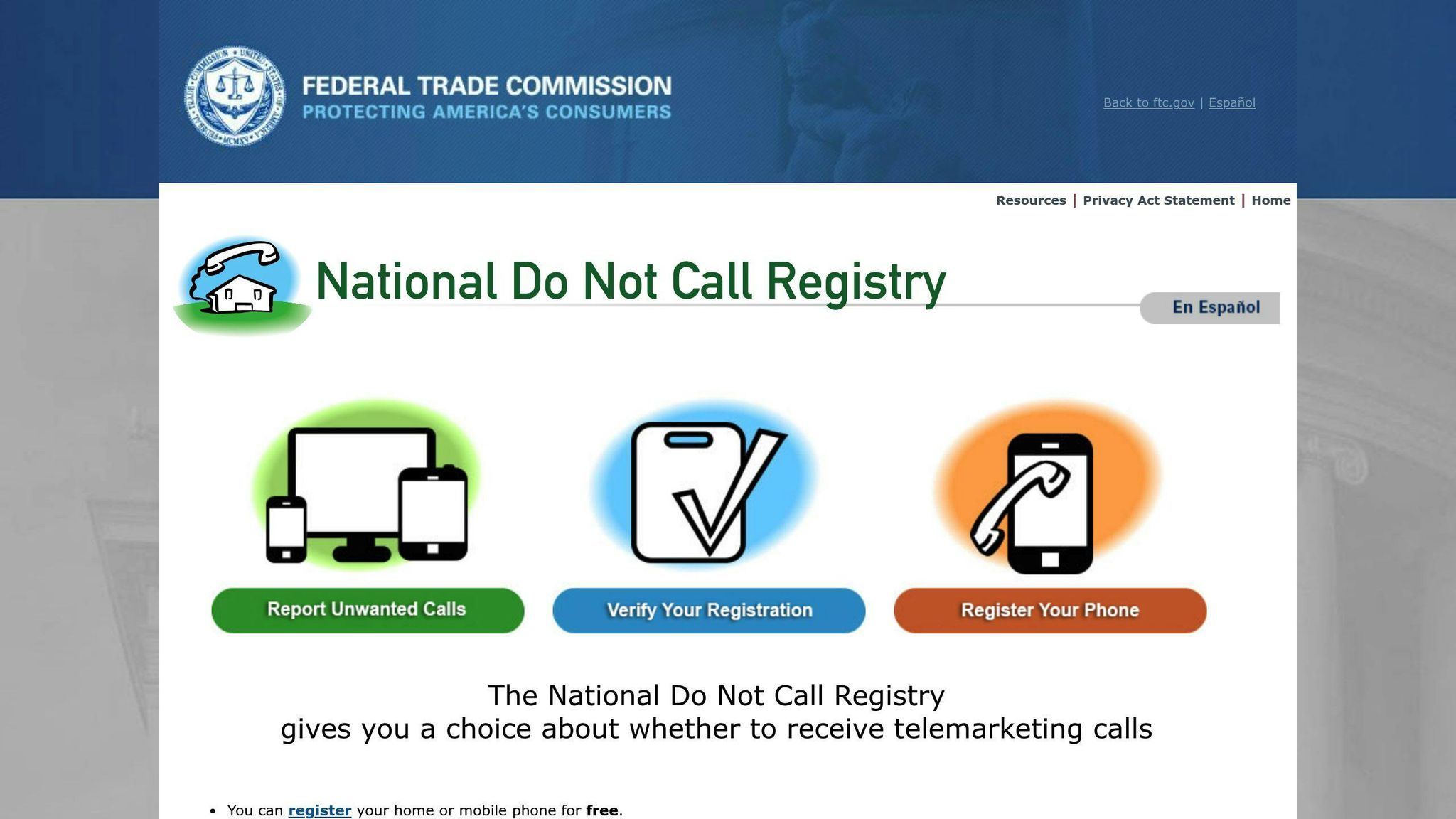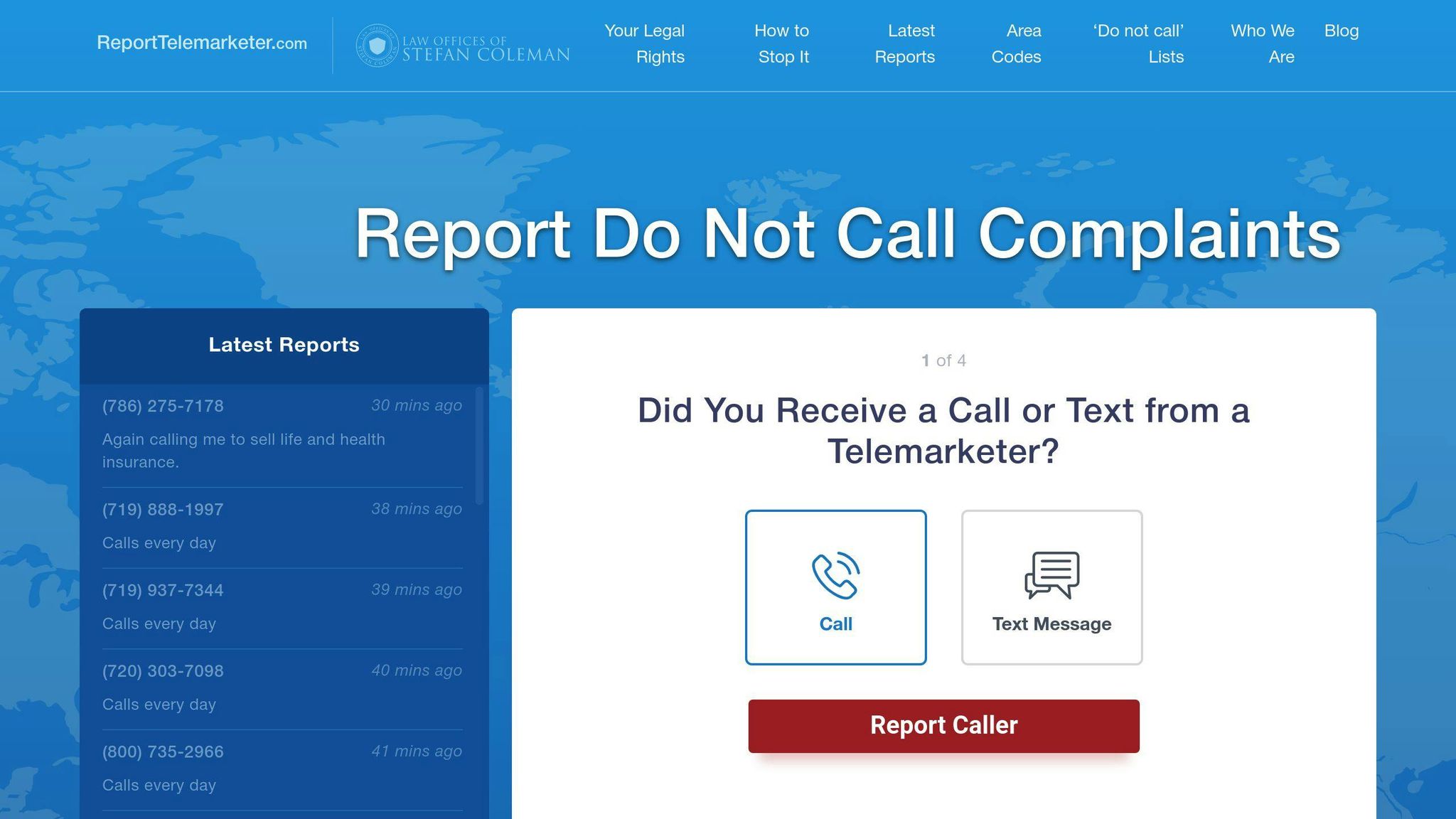
Filing a TCPA complaint can stop annoying telemarketing calls and even help you recover $500–$1,500 per violation. Here’s how you can take action for free:
- Document Violations: Record dates, times, caller info, messages, and opt-out attempts.
- Check the Do Not Call Registry: Ensure your number is registered for added legal support.
- File Complaints: Report violations to the FCC, FTC, and your state Attorney General.
- Seek Free Legal Help: Use services like ReportTelemarketer.com or work with TCPA attorneys on a contingency basis – no upfront costs required.
Take control of unwanted calls and protect your rights with these straightforward steps.
Federal Telemarketing Laws: TCPA Complaint Guide
Step 1: Get Ready to File a TCPA Complaint
To strengthen your case, gather all necessary evidence and documentation before submitting your TCPA complaint.
How to Record Telemarketing Violations
For every unwanted call or text, make sure to document the following:
| Information to Record | What to Include |
|---|---|
| Date and Time | The exact date and timestamp |
| Contact Method | Specify if it was a phone call, text, or voicemail |
| Caller Details | The phone number, company name, and caller ID |
| Message Content | Details like the sales pitch or product being offered |
| Your Response | Notes on any opt-out requests or refusals |
Keep voicemails and texts as evidence. These records are essential if you decide to file a complaint or take legal action.
Verify Your Number on the Do Not Call Registry

Confirm whether your number is listed on the FTC’s Do Not Call Registry. If it’s not, register it right away. Being on the registry can help support your legal case.
Collect Information About the Caller
Try to obtain the caller’s name, company name, contact information, and the reason for the call. If the caller refuses to provide details, note that too – it can strengthen your complaint. Services like ReportTelemarketer.com can help investigate violators and connect you with free legal assistance to take action against them.
Once you’ve gathered all the necessary information, you’ll be ready to file your complaint with the relevant agencies.
Step 2: Submit Your TCPA Complaint
Once you’ve gathered evidence of telemarketing violations, it’s time to officially report the issue to the proper authorities.
Filing a Complaint with the FCC
You can submit your complaint to the FCC through their Consumer Complaint Center online, by calling 1-888-CALL-FCC, or by mailing your complaint along with supporting evidence directly to their office. Be sure to specify whether the call was live or automated and include all the documentation you’ve collected.
Reporting Violations to the FTC
To report unwanted calls, head to the FTC’s Do Not Call Registry complaint page at donotcall.gov or use their main complaint portal. Provide details like the caller’s name, phone number, and a description of what happened. The FTC relies on these reports to track patterns of violations and take action against frequent offenders.
Contacting Your State Attorney General
Your state Attorney General’s office can be another valuable resource for dealing with TCPA violations. They may:
- Investigate complaints at the state level
- Pursue legal action against violators
- Offer advice on telemarketing laws and protections specific to your state
Many Attorney General offices have dedicated teams that focus on telemarketing issues.
You can file complaints with multiple agencies at the same time to improve your chances of stopping these unwanted calls. Be sure to keep copies of all your complaints and any related correspondence for your records.
After submitting your complaints, the next step is to explore free legal support to hold violators accountable.
sbb-itb-a8d93e1
Step 3: Find Free Legal Help for Your Complaint
You don’t need to spend money upfront to get professional legal assistance with your TCPA complaint. There are free resources and services designed to help you handle your case effectively.
How ReportTelemarketer.com Assists You

ReportTelemarketer.com offers a free service to help consumers deal with unwanted telemarketing calls and texts. Here’s what they provide:
- Investigating telemarketers and sending cease-and-desist letters
- Filing formal complaints
- Helping you recover compensation from violators
The service is completely free for users because attorney fees are collected from violators once a violation is proven.
In addition to this platform, you can also work with professional TCPA attorneys without paying anything upfront.
Collaborating with TCPA Attorneys for Free
TCPA attorneys usually operate on a contingency fee basis, meaning you only pay if they win your case. Here’s an overview of what to expect when working with them:
| Stage | What Happens | Cost to You |
|---|---|---|
| Initial Consultation | Attorney reviews your case and evidence | Free |
| Case Investigation | Legal team investigates violations | No charge |
| Legal Proceedings | Complaints filed and legal representation | $0 upfront |
| Settlement/Victory | Compensation recovered from violator | Attorney fees paid by violator |
To strengthen your case, provide your attorney with:
- Detailed call logs, including dates and times
- Saved voicemails and text messages
- Screenshots of caller ID information
- Records of any prior communication with the telemarketer
- Proof that your number is on the Do Not Call Registry
While legal proceedings can take time, experienced TCPA attorneys can increase your chances of stopping violations and securing compensation.
Conclusion: Steps to Stop Telemarketing Violations
Key Points to Keep in Mind
Taking action against telemarketers isn’t just about stopping the calls – it’s about protecting your rights and helping reduce these interruptions for everyone. The Telephone Consumer Protection Act (TCPA) gives you the tools to push back, with hefty penalties for those who break the rules. To make your case as strong as possible, keep detailed records of every violation. Here’s what to track:
| Type of Record | Why It Matters |
|---|---|
| Call Logs | Record dates, times, and phone numbers to show a pattern of violations. |
| Communication Evidence | Save voicemails, texts, and screenshots to provide solid proof. |
| Do Not Call Registration | Keep proof of your registration to back up your claims. |
| Opt-Out Attempts | Document any requests to stop calls and prior complaints to show your efforts. |
By organizing this information, you’ll be in a strong position to take action and hold violators accountable.
Next Steps to Take
Here’s how you can address telemarketing violations effectively:
- File complaints with both the FCC and FTC, providing all relevant details.
- Reach out to your state attorney general’s office for additional support.
- Use free services like ReportTelemarketer.com to investigate violations, file complaints, and even recover compensation.
Services like ReportTelemarketer.com handle investigations and complaints at no cost to you. Plus, TCPA attorneys work on a contingency basis, so you can get expert legal help without any upfront fees.
FAQs
How do I file a TCPA complaint?
Filing a TCPA complaint is straightforward and can be done online. The quickest way is to submit your complaint through fcc.gov/complaints. If you’d rather use a different method, you can:
- Call the FCC at 1-888-CALL-FCC (1-888-225-5322)
- Use the ASL Video Call service at 1-844-432-2275
Make sure to include key details like the caller’s information, the date and time of the calls, and any previous actions you’ve taken to stop the communications. This aligns with the steps outlined earlier for reporting issues to the FCC and FTC.
How do I report illegal spam calls?
You can report spam calls directly to the FTC. File a complaint at ftc.gov or call their helpline at 1-877-FTC-HELP.
For more details on the FTC’s work to address robocalls, check out ftc.gov/robocalls. The FTC investigates reported violations and takes action against illegal operations.
| Reporting Method | Where to Report | What to Include |
|---|---|---|
| FCC Complaint | fcc.gov/complaints | Call details, caller info, violation type |
| FTC Report | ftc.gov | Spam call details, frequency, opt-out attempts |
| State AG Office | Your state’s AG website | Local violations, patterns of calls |
Take the next step by documenting the evidence and looking into free legal resources to support your case.